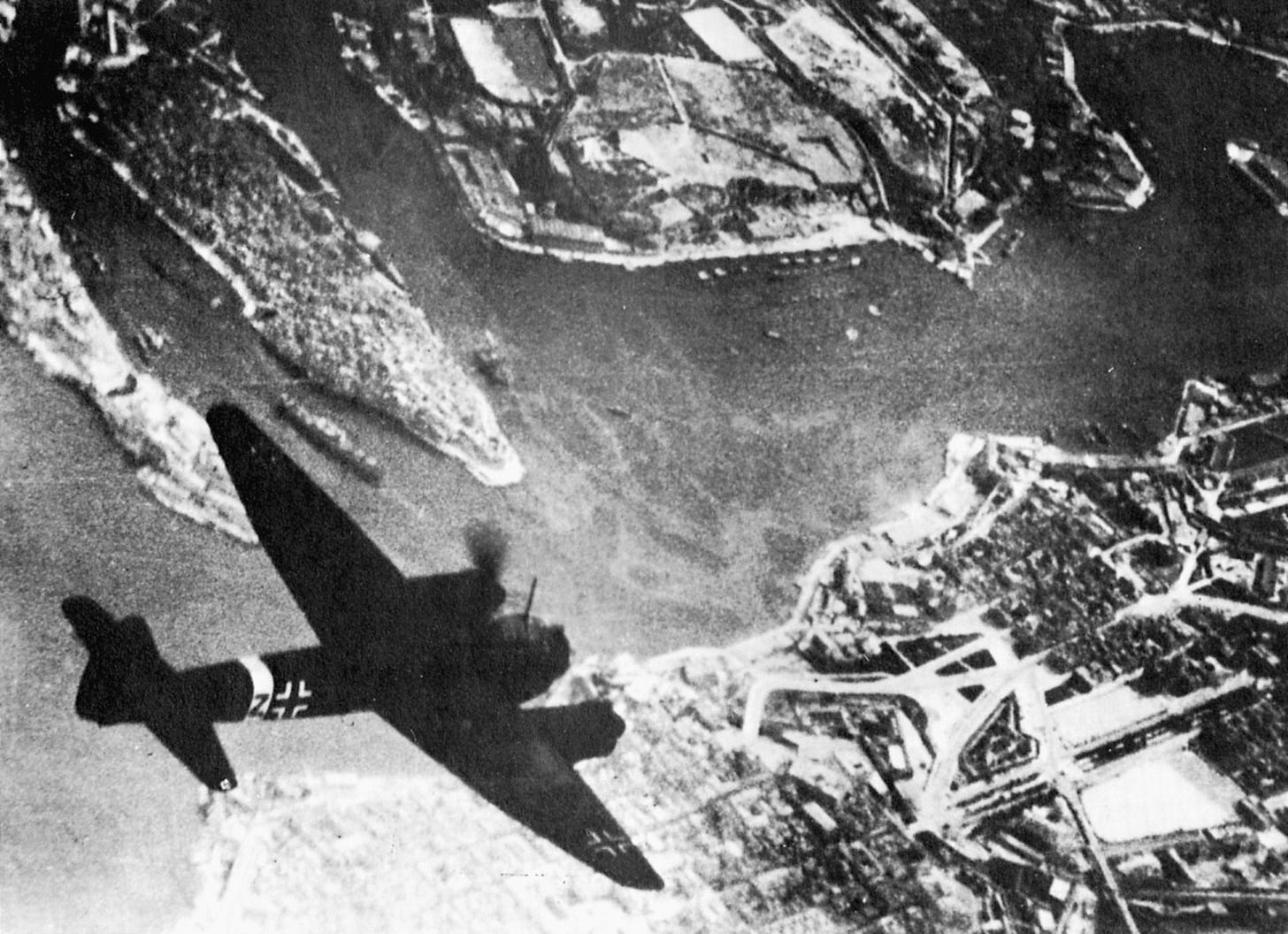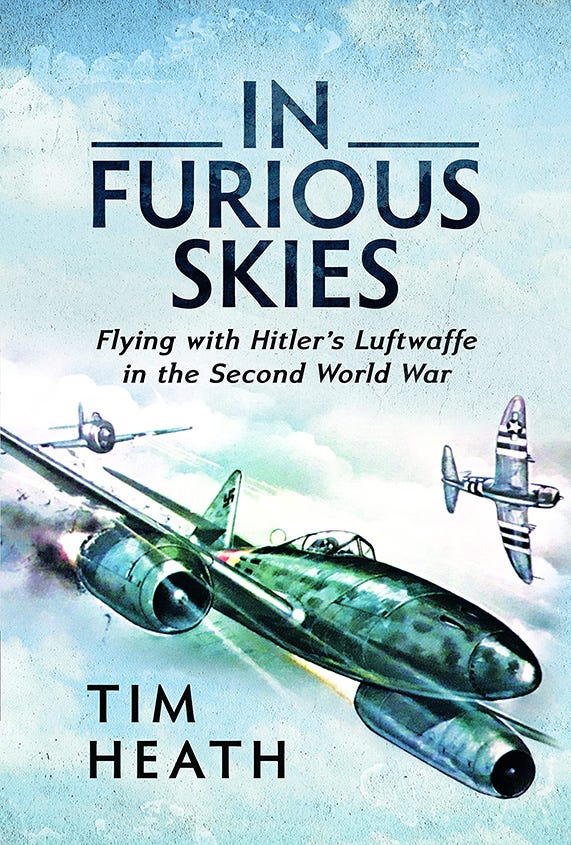In Furious Skies
A Luftwaffe pilot's account of the air battle over Malta - during the early days before the Spitfires arrived
Tim Heath has made a speciality of digging up new German and Japanese accounts of the war and bringing them to an English speaking audience. I have previously featured Hitler's Housewives - German Women on the Home Front as well as The Jungle War Against the Japanese - From the Veterans Fighting in Asia 1941-1945.
His latest collection, only just published in late 2022, is In Furious Skies - Flying with Hitler’s Luftwaffe in the Second World War. Heath provides plenty of context around the different theatres where the Luftwaffe were engaged and the aircraft they flew - but the great strength of this study is the numerous personal accounts by German pilots. They speak candidly about their attitudes at the time, about their aircraft and about the conditions in which they fought. It’s rather stronger on the early part of the war but the story does continue right the way through to the Jet and Rocket aircraft that eventually appeared. There are many accounts of individual air battles
.
The following account by a Messerschmitt Bf 109 pilot is introduced with some context about the Mediterranean war:
Perhaps the most significant action of the war in the Mediterranean was the siege of Malta. This British Crown Colony was of great strategic importance, not only to Britain who had air and naval assets based there but also the Germans. Malta was viewed as a priority target for the Axis in the Mediterranean as it allowed Germany’s enemies to disrupt Axis logistics routes to Libya. If the Germans could capture Malta, it would have a devastating effect on Britain’s ability to supply its forces in the Western Desert. The Germans particularly understood the importance of Malta as an enemy stronghold being so close as it was to Italy.
As a result, the island became the focus of one of the most intensive Luftwaffe bombing campaigns of the war. General Erwin Rommel, the enigmatic commander of the Axis ground forces in Africa, warned of the consequences of failure when he remarked, ‘If we fail to capture Malta, we will lose control of Africa.’
The Luftwaffe plan for offensive operations against Malta was simple: Malta would be bombed and starved into submission through a concentrated bombing campaign. Fliegerkorps X under the command of Hans Ferdinand Geisler duly arrived in Sicily in January 1941, tasked with offensive operations against British naval forces in an around the island as well as against RAF bases and infrastructure on the island itself. Again, the RAF would be faced with a war of attrition, outnumbered as they were in the air and inadequately equipped with Hawker Hurricane and Gloster Gladiator fighters.
The following month, February 1941, Messerchmitt Bf 109E-7 fighters of 7 Staffel, Jagdgeschwader 26 arrived; led by Oberleutnant Joachim Muncheberg, it was given the task of escorting the Stukas on their bombing attacks against Malta and the surrounding waters.
The Bf 109E-7 gave the Luftwaffe a huge tactical advantage over the RAF; besides its technical superiority, the Luftwaffe pilots were very experienced, confident, tactically astute, better equipped and very well trained. By way of comparison, the RAF aircrews on Malta had little actual combat experience and their Hawker Hurricane fighters were all but worn-out examples, with RAF mechanics cannibalizing spare parts in order to keep aircraft serviceable.
Major Fritz Helmut Goeth, who flew a 7 Staffel Messerschmitt Bf 109E-7, recorded in his diary a typical operation against Malta:
The whole Malta operation was what many would call a ‘walk in the park’ for us. It was obvious after the first few operations and sweeps over the RAF airfields on the island that they could not compete with us on terms of quality. We had the better aeroplane and the better-trained pilots, so we had the advantage over them. It became almost tedious: the Stuka geschwader would take off and we would follow, taking off several minutes later. We would soon catch them up and escort them to ensure they reached the island in safety.
Once over Malta, it was a free for all; the Stukas would dive to hit their assigned targets of the RAF infrastructure and aircraft on the ground while we would fly higher, watching out for any enemy aircraft attempting to intercept our Stukas.
Yes, Hurricanes attempted to intercept us, but we had height, speed and firepower advantages and the Hurricanes were either shot down or driven off. I chased one out to sea and he was jinking wildly from side to side in a futile attempt to throw off my aim, but it was useless.
There was no malice about it; in fact, I was saying under my breath, ‘Come on man, get out of the crate, get out now,’ but the pilot was probably dead in his harness and did not bale out of the aircraft. He was my fourth victory, yet it didn’t feel like a victory as it was all too damn easy, almost an unfair fight.
I closed in and fired my two 20mm cannons into him. I saw my shells go right through the entire length of the fuselage, tearing a gaping wound in the enemy’s side. I watched as my prey rolled over onto its back and, trailing flames, it headed down into the sea.
There was no malice about it; in fact, I was saying under my breath, ‘Come on man, get out of the crate, get out now,’ but the pilot was probably dead in his harness and did not bale out of the aircraft. He was my fourth victory, yet it didn’t feel like a victory as it was all too damn easy, almost an unfair fight.
When I turned around, I could see columns of thick smoke rising from the island where the Stukas’ bombs had fallen. I opened the throttle; some of our Stukas were on their way home, passing below me. I dived down to the RAF runways, where I could see a few vehicles and bowsers dotted around and a few aircraft on the ground burning. In fact, there was so much smoke it almost concealed the target area.
I flew along the runway and fired at some very dispersed Hurricanes. I used up the last of my cannon shells and turned for home. As I flew home, I was overtaken by two of our Messerschmitts. My comrades waved to me as if to say ‘a good job done’.
When we arrived back in Sicily there were celebrations all round. We drank a lot of wine and got quite drunk and smoked cigars. We were having a whale of a time there and Sicily was just beautiful, a paradise in many ways. Yes, I knew that the people of Malta were taking a real battering, but they had the option of surrender - our task was to assist in making that happen.
This excerpt from In Furious Skies - Flying with Hitler’s Luftwaffe in the Second World War appears by kind permission of Pen & Sword Books Ltd. Copyright remains with the author.






